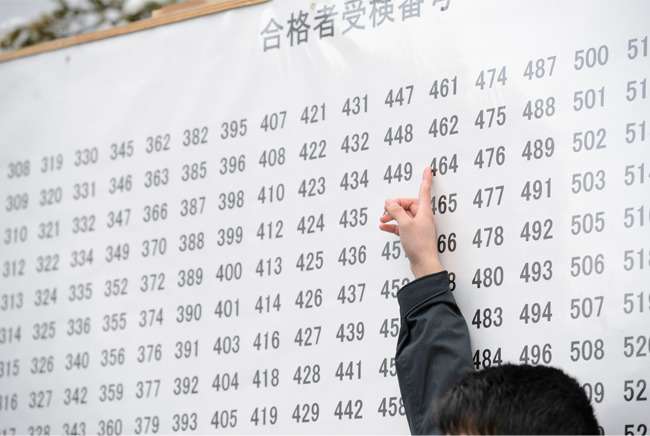Attention is focused on the announcement of the 2025 entrance examination subjects by each university due to the revision of the course of study, but the 2023 entrance examination for current third-year high school students will begin in earnest. In the 2023 entrance examination, we can see movements such as the introduction of a new entrance examination method at leading private universities in the Tokyo metropolitan area.In particular, the new general selection system at Waseda University and Sophia University and the relocation of Chuo University's Faculty of Law to the city center are likely to have an impact on other universities.We will look at these trends based on the latest expected difficulty level of entrance exams.

A new entrance examination method that stands out at leading private universities in the Tokyo metropolitan area
In the 2023 entrance examination, Waseda University, Sophia University, and Aoyama Gakuin University introduced new entrance examination methods, Chuo University's Faculty of Law moved to the city center, Rikkyo University and Toyo University established new faculties, and Tokyo University of Science reorganized its faculties and departments. A new movement can be seen at leading private universities with large numbers of applicants.Universities with a large number of applicants also have a large influence on the applicant trends of other universities, so applicants who do not apply to those universities are also indirectly affected.Among these, the most notable are the new system of Waseda University's Faculty of Education and the three-subject type of university entrance common test system newly implemented by all faculties of Sophia University (excluding the Faculty of Liberal Arts).
Waseda University's School of Education has introduced new methods C and D, which combine the common test for university entrance (hereinafter referred to as the common test) and individual examinations for each department and specialization, in addition to the conventional A system for liberal arts and B system for science. to be carried out.The humanities course A system is a 90 subject type of humanities, English, Japanese, and geography, and the science course B is a science subject type of English, mathematics, and science. Individual examinations (150 points allotted) will be conducted for each department and specialty.Individual exams vary in content and time, depending on the subject, such as English, national language, mathematics, etc., and the subject with specialization and comprehensive questions.
Waseda University has already posted sample questions on its website, and is taking other measures to make it more student-friendly. Method D is a method implemented only by the Department of Science and Biology, and consists of a common test for 90 subjects, 150 subjects (XNUMX science subjects), and an individual test.The allocation of points is XNUMX points + XNUMX points, which is the same as the C method.
Kawaijuku's university entrance examination information site, Kei-net, has announced the latest expected entrance examination difficulty ranking (as of September 12). Although the expected borderline score rate of the common test for C and D methods differs for each department and specialization, it is generally high at around 80%. 85%.Standardized tests have a lower point allocation than individual tests, but in Method C, when the number of applicants reaches approximately 8.0 times the number of recruits, the results of the standardized tests will be used for the first stage selection. The borderline is raised high.
The application deadline for both methods is January 20 (Friday), so you can apply in time even after looking at the expected borderline after the common test self-scoring tally.As for the expected difficulty level of the individual exams, there is no indication of the degree of difficulty for the comprehensive exams of education, social studies, and interdisciplinary culture, but other departments and specializations are expected to have a deviation value of 60.0 to 62.5.In addition, the expected difficulty level of the entrance examination will be updated according to future aspiring trends (difficulty, easy prediction, etc.), so it is a good idea to check it regularly.
Entrance exam difficulty prediction ranking table:
https://www.keinet.ne.jp/university/ranking/
Sophia University has a high expected border score rate for the three subject types of common tests
Sophia University will introduce a new 80 subject type in addition to the conventional 90 subject type under the common test system.Interviews are required for the Faculty of Theology, Department of Psychology, Faculty of Human Sciences, and Department of Nursing.At Sophia University, where there are three subject types and no individual exams, no matter what anyone thinks, the expected border score rate will be high.The expected border score rate of each department is almost XNUMX% or more, and the expected border score rate is high at XNUMX% for the Department of English, Faculty of Letters, Department of English, Department of Foreign Languages, and Department of Law, Faculty of Law.Each department recruits only XNUMX to XNUMX people, and the Department of Business Administration, Faculty of Economics, has the largest number of XNUMX people.
Of course, the actual number of successful applicants will be higher than the number of applicants, but since the application deadline is January 12 (Thursday), which is before the implementation of the common test, the number of applicants will be limited to the conventional four subject type. The actual magnification can be dozens of times depending on the department.
As mentioned above, the number of applicants for the 200-subject type of common test is expected to far exceed that of the conventional 100-subject type.Therefore, depending on the way of thinking, it can be said that aiming for the four subject type is more logical.The expected border score rate is naturally lower for the 100-subject type than for the 50-subject type. For the XNUMX-subject type, if you are a liberal arts student, you must take the Mathematics IA exam.In the case of science students, it is necessary to take the national language (modern, ancient, and Chinese) exams, but while other subjects are allotted XNUMX points, the number of points allocated for Japanese in the Faculty of Science and Technology is XNUMX points.Even if you are not good at these subjects, the allotted points are low, so if you do not mind taking the exam, there are many people in the examination industry who recommend the XNUMX subject type.
Currently, the expected border score rate announced is relatively high for the XNUMX-subject type, but it is thought that the actual rate will be even lower. With the introduction of the XNUMX-subject type, many departments are reducing the number of recruits for the XNUMX-subject type, so there is no choice but to set it higher at the forecast stage.
If the number of successful applicants of Sophia University's common test system increases, it will affect other universities
Also, it will be interesting to see how many people will be announced as the number of successful applicants for the three-subject type.Looking at the Sophia University website, it is possible to apply for both the XNUMX-subject type and the XNUMX-subject type.Since some of the applicants for the XNUMX-subject type and the XNUMX-subject type probably overlap, some of the successful applicants will also overlap.The university will also know this when making a pass/fail decision.
Therefore, regardless of overlap, the successful applicants will be announced separately for each of the XNUMX-subject type and XNUMX-subject type, or the number of applicants who have passed both methods will be counted, and the admission procedure rate will be reduced accordingly. The actual border score rate will change depending on whether the number of successful applicants in the XNUMX subject type, which is empirically known, is overestimated.
However, in any case, the number of successful applicants will increase from last year because of the new method.It is expected that this will affect other universities, and even each university in MARCH, and the rate of admission procedures using the common test method of each university in MARCH will decrease.The question is whether each university will anticipate this and announce a larger number of successful applicants than before, but it is a matter of concern because the increase or decrease in the number of successful applicants will directly affect the ups and downs of the borderline score rate.For students, the number of successful applicants is very welcome, but for universities, this is not necessarily the case.It's really hard to find the right balance between the two.

The impact of the relocation of Chuo University's Faculty of Law to the city center is surprisingly small?
Chuo University's Faculty of Law has been attracting attention since it announced its move to the city center (Myogadani, Bunkyo Ward), but from April 2023, first to fourth year students will study at the city center campus.The university's website states, "Students enrolled in 2023 and beyond will study at the Myogadani Campus in their 2022st to XNUMXth years. Students enrolled in XNUMX will study in their XNUMXst year at the Tama Campus, and in their XNUMXnd to XNUMXth years at the Myogadani Campus." All current undergraduate students will move to the new campus from April.
For those who know the geography of the Tokyo metropolitan area, I would like to preach to Shakyamuni, but Myogadani is a super city center inside the Yamanote Line, and it is about an hour and a half away from Chuo University Tama Campus by train.The relocation will make it easier to commute to school from various parts of the Tokyo metropolitan area, and in particular from Chiba Prefecture, it will be much easier to commute than before.Therefore, the number of applicants is expected to increase considerably, but the impact on other universities with many concurrent applicants may be unexpectedly small.
Chuo University's Faculty of Law is very popular with prospective students, even though it is located on the Tama Campus.Therefore, although there is an effect of relocating to the city center, from the perspective of examination trends, it is thought that there will not be much of an impact on multiple applicants.
Even now, it is already a very difficult university, so at this stage it is unthinkable to make it more difficult than it is now, and the aforementioned difficulty level is expected to be the same as last year.In addition, even before the relocation to the city center, the relationship with the concurrent applicant university has been superior.However, if the number of applicants to the Faculty of Law at Chuo University increases, the number of successful applicants will also increase.It greatly affects the admission procedure rate of the university to which you apply.
The 2021 entrance exam was an entrance exam in the corona misfortune in addition to the first year of the high school connection reform. In the 2022 academic year, students and university officials had a hard time in the second year of the corona wreck, but it seems that the 2023 entrance examination will not be calm.Both students and universities are involved, but the new movements of these influential private universities are a point of attention.
